#gee i wonder if that line is thematically crucial to their characters
Explore tagged Tumblr posts
Text
An analysis of Alhaitham's egoism in relation to Kaveh
(Update: The essay this is taken from is now uploaded! It can be accessed here and here as as a pdf <3)
Max Stirner's anarchist egoism is speculated to be the basis of Alhaitham's personal egoism, therefore I will be drawing upon Stirner's 'The Unique and Its Property' for this analysis.
Property and power are key principles within this philosophy. The egoist recognises himself as an individual, separate from the general collective of “humanity”, in which concepts such as freedom and property are governed to and over the people, for then the individual is not considered as such, rather they are a part of “humanity”, rather than a whole individual (Stirner, 170). This thinking is demonstrated within Alhaitham’s Story Quest, where he dismantles Siraj’s Hivemind by targeting individuals that compromised the Hive and reminding them of their own beliefs and preferences – the individual in themselves is a whole, and is not a “part” of a system (Stirner, 170).
In this, the egoist governs himself by what he owns and what he wants to own: “ownness is my whole essence and existence, it is myself. I am free from what I am rid of, owner of what I have in my power, what I control. I am at all times and under every circumstance my own”(Stirner, 106). This relates to the concept of freedom, which, for an egoist exists according to having the power to be free of something, for example, being freed of hunger, thirst, or societal expectations (Stirner, 105). This is reflected within Alhaitham’s description: “He lives free – free from the searching eyes of ordinary people,” but also extends to the power to own.
As power is considered something which the egoist owns, property then becomes something which the egoist exerts power over, and in this, can property be made use of by the egoist – all the while, the property remains an independent vessel (Stirner, 162). This is seen within Alhaitham’s view on his vision, in that it is “no more than a useful tool”, as it can be used to serve his own needs, and that since it in his possession, he has obtained it with his own power, it makes no difference to check on it as he continues to retain that power.
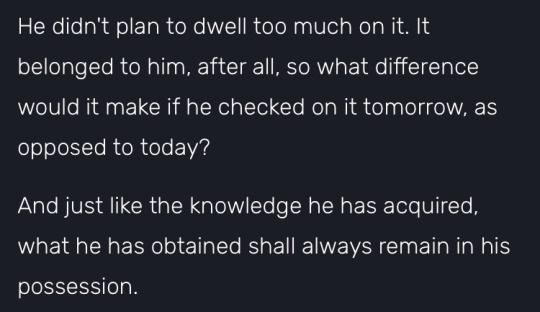
In this sense then, Alhaitham has constructed his life around this form of egoism, in that anything he wants, he has, such as his job as the Scribe, his house, the interests he pursues, the people he enjoys. In order to maintain this way of life, he will deal with, or be rid of, anything he deems as "harmful".

With this, the egoist seeks satisfaction in themselves through the satisfaction of another. Ownership, in relation to another person, can become love, which like all things the egoist has power over, is ultimately theirs – as in their love for a person (Stirner, 187), which is given willingly by the egoist, for loving a person is done for the satisfaction that love brings: “But I love them with the awareness of egoism; I love them because love makes me happy, I love because love is natural to me, it pleases me,” (186).
In loving another comes sacrifice, which the egoist can give into without compromising himself, as he himself sets the “purchase price of [his love]” (187) according to the happiness attributed to the loved one, as in return, the egoist shall also receive happiness (186). To enjoy someone, in an egoist fashion, is to be able to sacrifice all possessions and ownerships without foregoing the sense of an individual, of “ownness”, as the egoist would then lose his objectivity:
“I can deny myself countless things to heighten his pleasure, and I can risk for him what would be dearest to me without him, my life, my welfare, my freedom. Indeed, it forms my pleasure and happiness to feast on his pleasure and happiness. But me, myself I do not sacrifice to him, but rather remain an egoist and—enjoy him. If I sacrifice to him everything I would keep without my love for him, that is very easy… But if I sacrifice others to one passion, I still do not… sacrifice my particular worth, my ownness. Where this nasty incident occurs, love looks no better than any other passion that I blindly obey.” – The Unique and Its Property, 185
It is relevant to note that just as the egoist receives happiness from a loved one’s pleasure, so does an egoist suffer from a loved one’s despair. Just as the egoist would sacrifice something of their own to provide happiness for a loved one in order to exact their own happiness, so too would an egoist sacrifice something, or act, to eradicate the root problem of a loved one’s misery, as this, in turn, would then resolve their own misery:
“If I see the beloved suffering, I suffer with him, and I find no rest until I’ve tried everything to comfort and cheer him…. It doesn’t follow from this that the same thing causes suffering… his tooth gives him pain, but his pain gives me pain. But because I cannot bear the sorrowful crease on the beloved forehead, therefore, then for my sake, I kiss it away. If I didn’t love this person, he could go right on creasing his forehead, that wouldn’t trouble me; I’m only driving away my troubles. – The Unique and Its Property, 186
The phrasing of “driving away… troubles” is particular to note here, due to similar usages of language used within Alhaitham’s Character Stories, in relation to him acting in accordance with his self-governed rules and serving his own self-interest by: “[acting] on his own will and deals with anything that appears harmful in his eyes”.
Kaveh, however, interprets Alhaitham’s egoism as a detached, pragmatic view of humanity, in which the individual isolates themselves not only as a means of prioritisation, but by elevating oneself over others by refusal to intermingle and to cooperate for the benefit of others. Not only is this a harmful opposition to Kaveh’s view of individuals sharing their knowledge and talent in order to pursue a better society, but due to Kaveh’s experience of Alhaitham’s personal egoism, it is harmful to Kaveh personally. Kaveh refuses to prioritise himself over others because he has seen a negative consequence of egoism, in which he has been “cut to the quick” and it has ended one of the few stable relationships in his life.

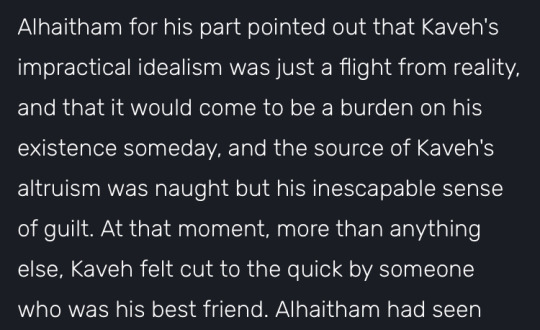
By Kaveh seeing Alhaitham’s comment about his altruism as malicious, Alhaitham has elevated himself over Kaveh, since Alhaitham does not have the same struggles as him, and has trivialised Kaveh’s trauma. To Kaveh, Alhaitham’s prioritisation of the self actively harms others as it desensitises the self to the emotions of others. Therefore, Kaveh opposes the egoism which Alhaitham advocates for, since he interprets it through his own lived experience. Hence, by Alhaitham asserting egoism over Kaveh as a means of Kaveh prioritising himself, it only reinforces Kaveh to strive to consider the feelings of others, as well as to not prioritise his own way of thinking if it undermines someone else’s.
In actuality, Alhaitham’s frustrations with Kaveh lie in his belief that Kaveh’s talents are incongruous with his values, and that if Kaveh were to prioritise himself, he would save himself suffering and enable himself to discover his “true self”, unrestricted by others placing labels onto him.
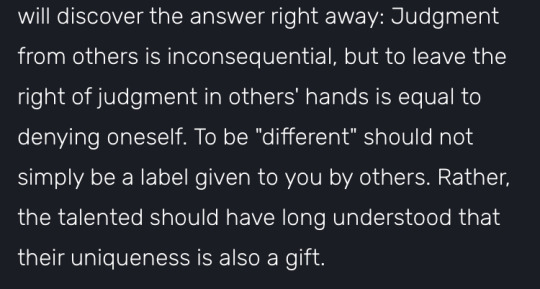
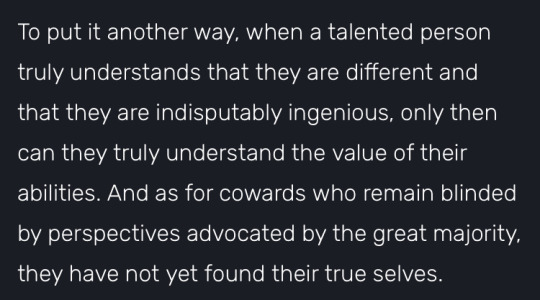
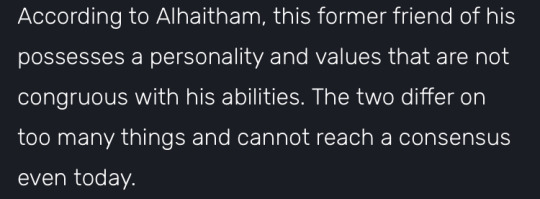

This is a personal frustration which Alhaitham would not compromise himself to assert onto a person he was indifferent to, due to his belief of not getting involved with other’s fates. However, he has been observed to ‘subvert’ his own rules to accommodate Kaveh. Through egoism, it can be seen that rather than ‘subverting’ these rules, Alhaitham adheres to them as an egoist, since he sees Kaveh as his mirror, they offer each other a contrasting perspective he believes they need to have a complete, objective vision of the world.
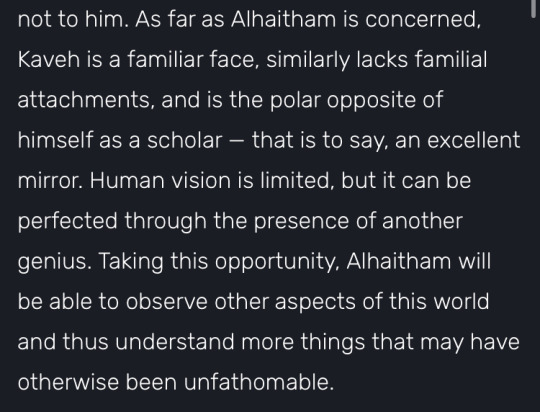
This is necessary for Alhaitham to consider within his own life, and therefore has extended his house to Kaveh, in order to expand his scope of thinking, and to consider perspectives he otherwise would not entertain. Kaveh’s ideals, his beliefs, and his philosophies explicitly interest Alhaitham, in contradiction with Kaveh believing that Alhaitham is disdainful of his perspectives.
In this way, Alhaitham enjoys Kaveh. He willingly pays for some of Kaveh’s tabs; pays for crates of wine for the two of them; and goes out of his way to pursue interactions with Kaveh. Just as Alhaitham is to Kaveh, Kaveh is an old friend, as unchanged in his beliefs as he was in the past and thus is a constant: “the most unshakable part of one's past is a friend that will never change”’.


Alhaitham strives to act in accordance to his own egoism and therefore assesses what “appears harmful” to him, in relation to these rules, so as to be rid of them. This can be extended to Kaveh, as Kaveh falls under what ‘belongs’ to Alhaitham, in the sense that ownership equates to Alhaitham’s enjoyment.
Alhaitham wants to have Kaveh in his life due to the alternate perspective which Kaveh offers him, thus expanding his horizons and granting him knowledge he otherwise would not obtain. As well as this, Kaveh is seen to be considered part of Alhaitham’s way of life that he wants to protect. In line with Stirner’s egoism, it follows that as Alhaitham enjoys Kaveh, as in, ‘owns’ the contentment Kaveh elicits, he therefore is affected by Kaveh’s self-inflicted grievances. Therefore, Alhaitham sees Kaveh’s altruism at the expense of his own wellbeing as something “harmful” to be dealt with, as this not only causes Kaveh inward misery, but also detriments Kaveh finding his “true self” (Alhaitham Character Story 3), which the egoist pursues above all else.
#i realised i hadn't actually discussed their philosophies in a post so here's an snippet from The Essay#kaveh's altruism is brushed over here but i didn't want this post getting too expansive oops#since their differences are the basis of the essay it's hard to filter that down into one post?#basically i'm aware that this reads as incomplete but i promise there is more where this came from!!!#also im reading that line: the two cannot reach a consensus even to this day#and im going insane because isn't that the resolution of their conflict? to find middle ground?#gee i wonder if that line is thematically crucial to their characters#also kaveh reads page 185 of the unique and its property and fights off a blush before denying everything#can they talk. please. im sick of them#the essay is coming along btw!!! thank you for all your thoughts and encouragement!!#haikaveh#alhaitham#kaveh#kavetham#haikaveh meta#genshin meta
138 notes
·
View notes